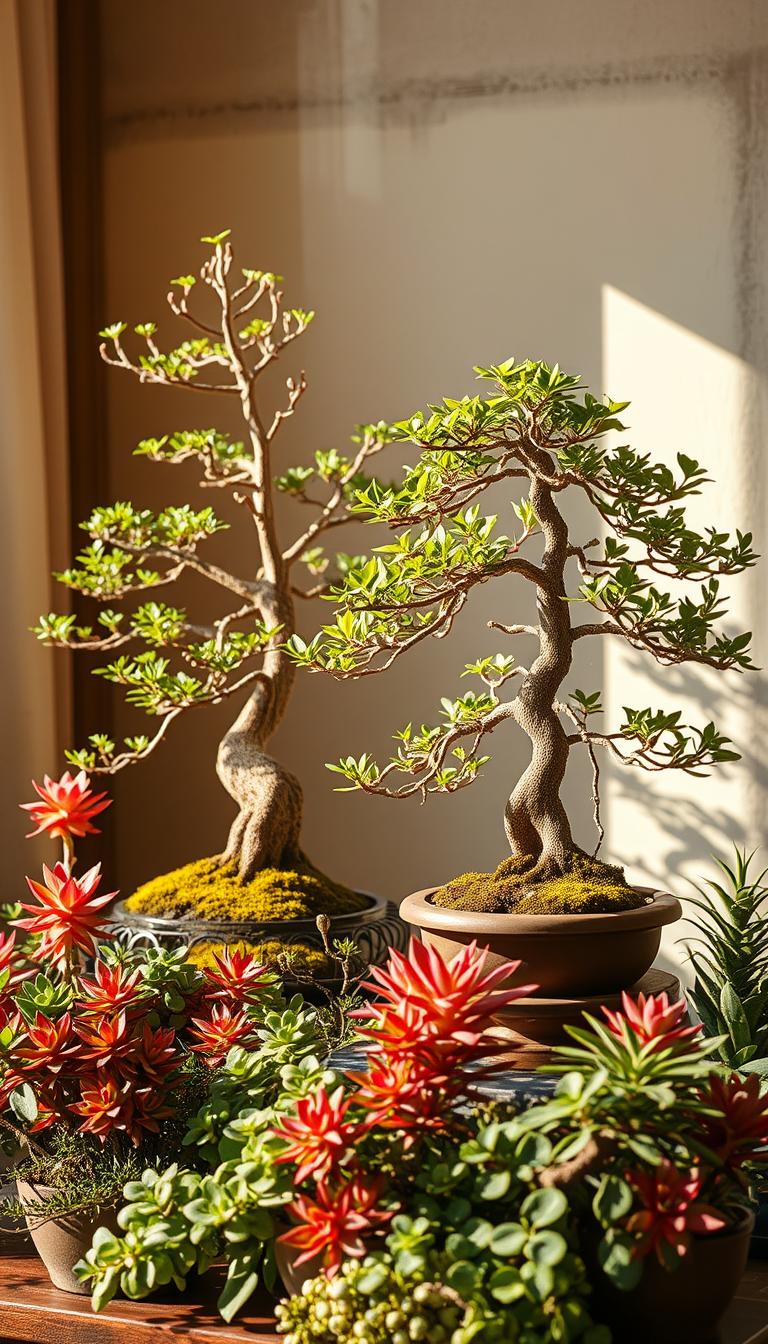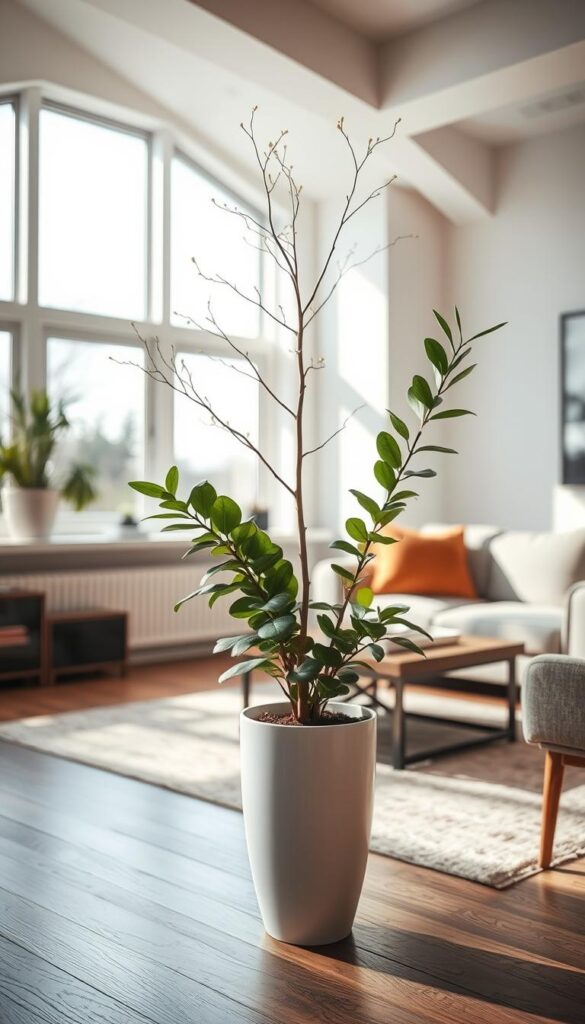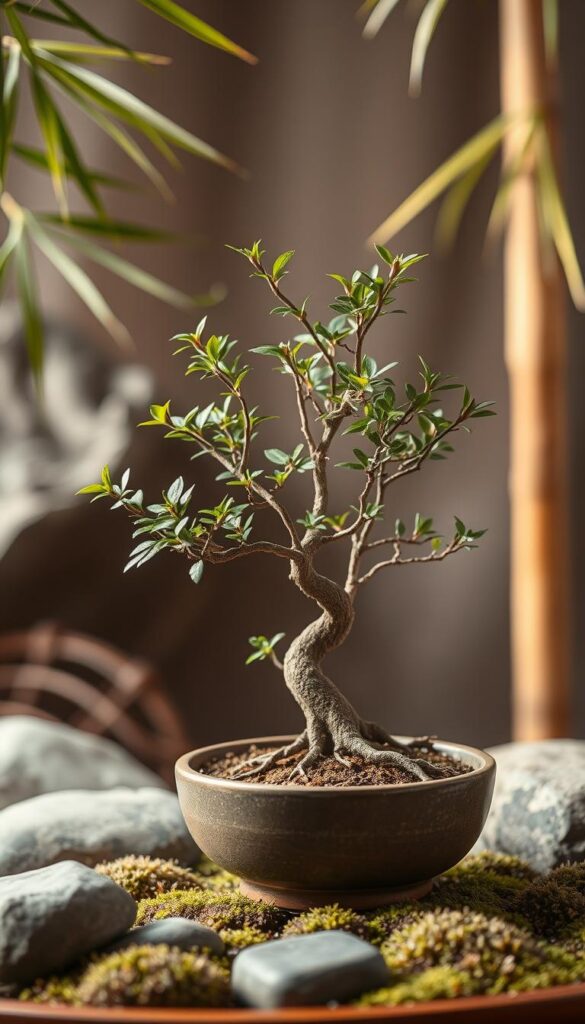Imagine stepping into a space where nature and art blend seamlessly. Bonsai accent plants are more than just decorative elements; they are living pieces of art that bring harmony and balance to any room.
My journey with bonsai began when I discovered how these small plants could transform a simple corner into a focal point. The traditional Tokonoma display, featuring a bonsai tree, an accent plant, and a calligraphy scroll, inspired me to create my own serene spaces.
The combination of a bonsai tree and an accent plant symbolizes the unity of nature and human creativity. Even a single accent plant can add a touch of elegance, turning your home into a gallery of living art.
I’m excited to share how these displays have brought joy to my daily life. By thoughtfully arranging soil and bonsai trees, I’ve discovered the creative possibilities they offer.
Join me as I explore the beauty of bonsai accent plants and how they can elevate your home decor. Let’s dive into the world where nature and art come together in perfect harmony.

Discovering the Charm of Bonsai Accent Plants
Discovering the charm of accent plants has been a delightful journey, revealing how they enhance the beauty of bonsai displays. These plants are not just additions; they are essential elements that bring depth and harmony to the overall arrangement.
The Role of Accent Plants in Traditional Tokonoma Displays
In traditional Tokonoma displays, accent plants play a vital role by complementing the bonsai tree. They reflect the season, adding layers of interest through flowering or foliage. This balance creates a natural, harmonious display that captures the essence of nature.
My First Encounter with This Unique Art Form
My first encounter with this art form was inspiring. I was captivated by the careful pairing of flower and foliage, which transformed a simple space into a serene environment. The way the accent plant supported the bonsai tree, balancing its visual weight, was truly remarkable.
| Aspect | Flowering Accent Plants | Non-Flowering Accent Plants |
|---|---|---|
| Seasonal Interest | Flowers add vibrant color and seasonal charm. | Foliage provides texture and year-round appeal. |
| Examples | Cherry blossoms, azaleas | Ferns, mosses |
| Benefit | Enhances seasonal themes | Offers consistent beauty |
The right pot and soil are crucial for the accent plant to thrive alongside the bonsai tree. Even small touches, like winter hues or a delicate fern, can elevate the display, creating a miniature landscape that tells a story.
Selecting the Perfect Accent Plant for My Space
When it comes to choosing the right accent plant, I always start by thinking about the season. Spring, for example, brings vibrant colors and fresh textures that can completely transform a room. I look for plants with flowers or foliage that match the mood I want to create.
Matching Seasonal Colors and Textures
In the spring, I love using flowering plants like azaleas or cherry blossoms. Their bright colors add a lively touch and complement the natural beauty of my bonsai tree. During other seasons, I opt for plants with interesting foliage, such as ferns or mosses, to keep the display looking fresh and dynamic.
Choosing the Right Pot and Supporting Elements
The pot is just as important as the plant itself. I prefer glazed or unglazed pots that complement the style of my home. The soil and drainage are also crucial for the health of the plant. I make sure to choose a pot that not only looks good but also provides the right conditions for my accent plant to thrive.
Over time, I’ve learned to balance the size and variety of the accent plant with the bonsai tree and the surrounding garden elements. It’s all about creating a harmonious display where every piece works together to tell a story. By paying attention to these details, I can craft a space that feels inviting and cohesive.

Crafting Harmonious Displays with Bonsai and Complementary Greenery
Creating a harmonious display with bonsai and complementary greenery is an art form that brings nature indoors. By thoughtfully combining elements, I craft small gardens that tell their own stories.
The Art of Companion Planting
Companion planting is at the heart of my bonsai displays. I pair bonsai trees with greenery that mirrors their natural habitats, like moss on rocks or ferns by water. This creates authentic, organic-feeling arrangements that reflect nature’s balance.
Incorporating Natural Elements: Moss, Rock, and Water
Natural elements like moss, rock, and water add depth to my displays. Moss softens rock surfaces, while water adds movement. These elements, inspired by traditional Japanese gardens, bring authenticity and storytelling to my miniature landscapes.
Designing Miniature Landscapes That Tell a Story
Every display is a miniature landscape. I layer soil and choose pots that support both beauty and care. Arranging roots, ferns, and varied textures emphasizes nature’s delicate yet powerful expressions, creating spaces that evoke seasonal moods.
| Element | Role in Display | Examples |
|---|---|---|
| Moss | Softens surfaces, adds texture | Garden moss, sphagnum moss |
| Rock | Provides structure, mimics natural formations | Granite, slate |
| Water | Adds movement, reflects light | Small ponds, trickling streams |
| Ferns | Enhances foliage, adds delicacy | Boston ferns, maidenhair ferns |
By blending these elements, I create displays that feel like natural landscapes, bringing the outdoors into my home in a way that’s both beautiful and meaningful.
Practical Care Tips for Bonsai Accent Plants Arrangements
Caring for bonsai accent plants is an art that requires attention to detail and a consistent routine. Over the years, I’ve learned valuable lessons on how to keep these beautiful displays thriving.
Watering, Soil, and Maintenance Essentials
Watering is one of the most critical aspects of care. Since these plants are in shallow pots, they dry out quickly. I water my plants regularly, ensuring the soil stays moist but not soggy. Proper soil composition is also vital—using a well-draining mix helps prevent root rot and promotes healthy growth.
Maintenance involves more than just watering. Trimming roots and replacing soil as needed are essential tasks. These practices, learned through experience and study, ensure the plants remain robust and vibrant.
Adjusting Care with the Changing Seasons
Seasonal changes require adjustments in care. In winter, I add extra moisture to combat dry air, while in summer, I provide shade to protect the plants from intense heat. These adjustments ensure the plants adapt well to different conditions.
Choosing the right pot is also crucial. I select pots that complement my home’s style and ensure proper drainage. Monitoring water levels helps the plants flourish, even in challenging conditions.
| Season | Care Practices |
|---|---|
| Spring/Summer | More frequent watering, fertilizing, and pruning. |
| Autumn/Winter | Reduced watering, adding moisture, and protecting from cold. |
By following these care tips, you can create a stunning bonsai display that brings joy and serenity to your home.

Reflecting on a Journey of Green Beauty
Reflecting on my journey with these living art forms, I’ve discovered how they’ve transformed not just my spaces, but also my appreciation for nature and creativity. Each display is a living canvas, evolving with care and attention, telling its own story as the seasons change.
Over the years, I’ve experimented with different pot sizes, natural elements like grass and rock, and seasonal touches. These experiments have deepened my creative process, teaching me how to balance color, texture, and natural beauty. Even unexpected growth, like perennial roots, adds character to each arrangement.
The sense of beauty in each display comes from thoughtfully integrating natural elements. Moss softens rock surfaces, while flowers add vibrant color. This blend creates a harmonious, ever-changing art form that brings joy and serenity to my home.
I encourage you to trust your instincts and explore the world of living art. With patience and care, you can craft stunning displays that reflect your personal style and love for nature. Let your creativity grow with every season!
